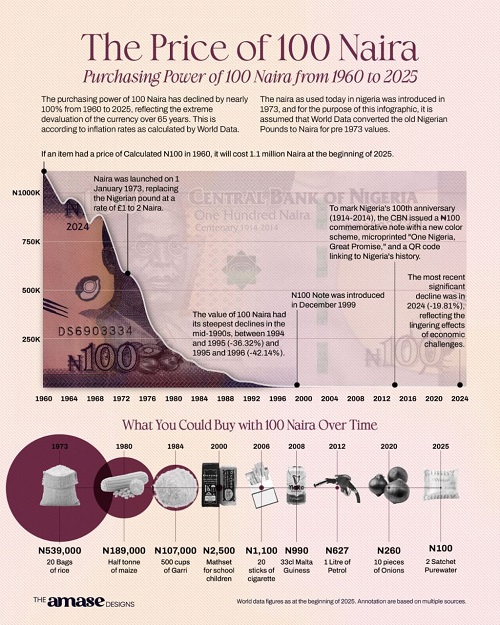In 1981, ₦1 million in Nigeria was life-changing wealth, worth about $1.57 million. By 1991, it had collapsed to $102,517. In 2001, just $8,814 and by 2011, it was $6,382, and by 2021, a mere $2,421. Now in 2025, ₦1 million is worth barely $625. In one generation, what once made you a dollar millionaire can hardly fund a family holiday.
This is more than numbers—it reflects the painful erosion of purchasing power, the stripping away of opportunities, and the cumulative price of decades of economic mismanagement. Weak institutions, poor respect for the rule of law, prebendal politics, and transactional governance have all deepened the crisis.
The lesson is clear: if you keep your wealth and livelihood tied solely to the naira, you will continue to lose value. Complaining won’t stop the slide.
For individuals, the way forward is to diversify income, build globally relevant skills, and hedge against further depreciation. Survival today demands thinking global while acting local.
For Nigeria as a nation, the solution cannot be endless dollar chasing. The naira can be strengthened from within—if we boost productivity, diversify exports beyond oil, restore fiscal and monetary discipline, and rebuild trust in governance. Strong, empowered institutions—not individuals—must anchor this change. And we must foster optimal collaboration between academia, industry, and government—the triple helix model—to drive innovation and productivity.
In summary, From $1.57 million in 1981 to just $625 in 2025, the value of ₦1 million tells the story of Nigeria’s lost purchasing power and decades of economic mismanagement. The naira’s decline is a symptom of weak institutions, poor governance, and overdependence on oil.
For individuals, the lesson is to diversify income and think global while acting local. For the nation, the answer lies not in chasing dollars but in boosting productivity, diversifying exports, restoring fiscal discipline, and rebuilding trust so the naira itself can regain strength and pride.
In the end, protecting our future is not just about working hard or earning in foreign currency—it is about building an economy where the naira itself is once again worth holding with pride.
Depending on oil alone, what about the entire Middle East? They don’t manufacture, but use oil money to create sustainable life for the region. They have mastered the act of turning weak sustainability to strong sustainability. If we talk about absolute value, that may lead to wrong conclusions. Instead we should be talking about per capita. On the other hand, we have land and waters for agriculture which they don’t have in Middle East. The richness in agricultural potential that God gave us should have balanced the equation if good governance is in place. The then Western state was the first to build a university from agricultural revenue only. University of Ife (now Obafemi Awolowo University) has the best architectural layout before federal government took over. I will stop here before I make my conclusions even though I have much to say.
The industrial revolution in the western world most especially in America hinged on the availability of energy systems. Check “the role of natural gas in Nigeria power generation: challenges, constraints and opportunities; SPE 178394”.
If the child has been sick for 65yrs and no cure, what next? Death!
Please note this, very important: THE BURDEN OF ENERGY CHALLENGES GROWS WORSE WITH INCREASE IN POPULATION.
Prof. Wumi Iledare PhD
Professor Emeritus of Petroleum Economics / Principal Facilitator, FUPRE Energy Business School / Executive Director, Emmanuel Egbogah Foundation


Comment here